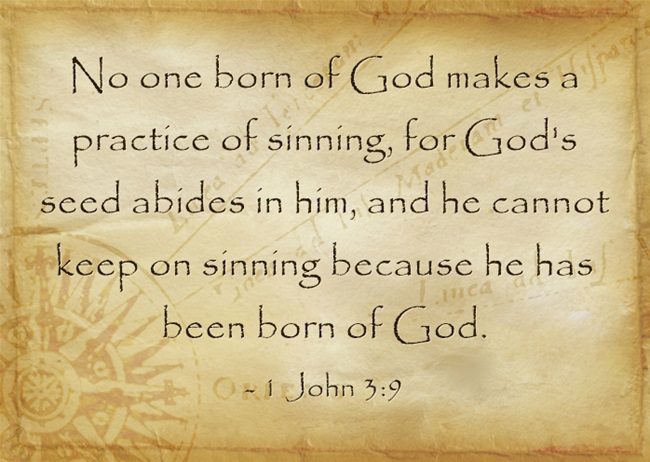Why did the Apostle John write the Book of 1st John? What applications does it have for us today?
The Author
We can say with confidence that the Apostle John is the author of the Book of 1st John. This book was among the latest of all written books in the New Testament, John having written all of them. The last books in the Bible to be written were 1st John (AD 85-95), 2nd John (AD 85-95), and 3rd John (AD 85-95) as well as the Book of Revelation, which was apparently written near the turn of the century or around AD 90-95 however some very good Bible scholars have confidence that Revelation was written before the fall of Jerusalem in AD 70. That would make the Book of Revelation the very last and oldest book ever written in the Bible. The Gospel of John was written about the same time (AD 85-90) as 1st, 2nd, and 3rd John were. Not only was 1st John written after the destruction of Jerusalem in AD 70 but all of John’s books came after the fall of Jerusalem and the destruction of the temple. This was when the temple sacrifices stopped and there has never had another sacrifice since.
The Purpose
The Apostle John is concerned about the church having a full assurance of their salvation but more than that, the Apostle John wrote 1st John for the purpose of proving who was and who was not a real Christian. Many had left the church but John told them that “They went out from us, but they were not of us; for if they had been of us, they would have continued with us. But they went out, that it might become plain that they all are not of us” (1st John 2:19). If they had stayed, they would be of them. Their leaving proves they weren’t part of the body of Christ in the first place. We can never know for certain since only God can look at the heart but Jesus did say that we will know them by their fruits (Matt 7:16). Thorn bushes will not be producing good fruit any more than a good tree will be producing thorns (Matt 7:15-20). In this same light, John writes “Whoever makes a practice of sinning is of the devil, for the devil has been sinning from the beginning” (1st John 3:8) because “No one born of God makes a practice of sinning, for God’s seed abides in him, and he cannot keep on sinning because he has been born of God” (1st John 3:9). For John it is plainly “evident who are the children of God, and who are the children of the devil: whoever does not practice righteousness is not of God, nor is the one who does not love his brother” (1st John 3:10). You can say you’re a Christian but if you don’t love your brother or sister and your practice in life is sinning, then you’re really of the Devil. That’s not my opinion. That’s what God’s Word says (1st John 3).
The Focal Point
The Apostle John is so concerned that our lives reflect our faith in Christ that he devotes two whole chapters (3 and 5) to discerning whether someone is just professing faith or actually possessing faith. He writes “that everyone who has been born of God does not keep on sinning, but he who was born of God protects him, and the evil one does not touch him” (1st John 5:18). Part of John’s purpose is to also reassure the believers that they can know that they are saved, so he writes with confidence that “We know that we have passed out of death into life, because we love the brothers. Whoever does not love abides in death” (1st John 3:14). In other words, we’ve received eternal life and it’s obvious, because we love our brothers and sisters in tangible ways. Those who don’t love them are abiding in death and have God’s wrath abides on them too (John 3:36b). John wants those in the church to know that “if our heart does not condemn us, we have confidence before God” (1st John 3:21) and then “whatever we ask we receive from him, because we keep his commandments and do what pleases him” (1st John 3:22).
Sinning and Confession
Many believers are burdened down by unnecessary guilt but there’s a difference between human guilt, the enemies condemnation, and conviction by the Holy Spirit. The Spirit of God convicts us in specific ways about specific sins…the enemy might tell us “We’re doomed, we’re false converts, God can’t possibly save us.” Condemnation is from the Devil, conviction is from God the Spirit. John wants every one of us to know that when we sin…when, not if, we can come to God immediately and confess it. Something wonderful happens after something so awful; “If we confess our sins, he is faithful and just to forgive us our sins and to cleanse us from all unrighteousness” (1st John 1:9) but we must be honest with God because “If we say we have no sin, we deceive ourselves, and the truth is not in us” (1st John 1:8) and “If we say we have not sinned, we make him a liar, and his word is not in us” (1st John 1:10).
Conclusion
When the Apostle John wrote 1st John, the church had been fractured and badly wounded but had managed to spread due to the destruction of Jerusalem, the temple and the dispersal of the believers. The Christians were spread, once more, by persecution and even though thousands upon thousands of Jews and even Jewish Christians were murdered, their blood gave seed to church growth. That has always been the case with the body of Christ. John writes; “these things to you who believe in the name of the Son of God that you may know that you have eternal life” (1st John 5:13) and so “We know that we are from God” (1st John 5:19).
Article by Jack Wellman
Jack Wellman is Pastor of the Mulvane Brethren Church in Mulvane Kansas. Jack is also the Senior Writer at What Christians Want To Know whose mission is to equip, encourage, and energize Christians and to address questions about the believer’s daily walk with God and the Bible. You can follow Jack on Google Plus or check out his book Teaching Children the Gospel available on Amazon.
















